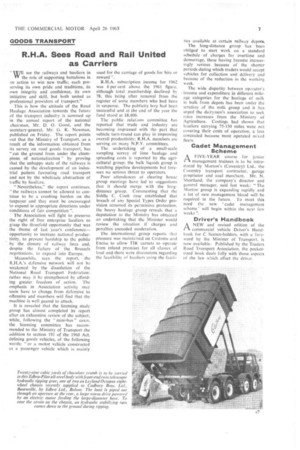R.H.A. Sees Road and Rail United as Carriers
Page 9

If you've noticed an error in this article please click here to report it so we can fix it.
" WE see the railways and hauliers in the role of supporting battalions in an action to win new traffic, each preserving its own pride and traditions, its own integrity and confidence, its own initiative and skill, but both united as professional providers of transport."
This is how the attitude of the Road Haulage Association towards the future of the transport industry is summed up in the annual report of the national chairman, Mr. D. 0. Good, and the secretary-general, Mr. G. K. Newman, published on Friday. The report points out that the Ministry of Transport, as a result of the information obtained from its survey on road goods transport, has "cut the ground from under the champions of nationalization" by proving that the unhappy state of the railways is caused by the development of an industrial pattern favouring road transport and not by the wholesale abstraction of traffic by hauliers.
"Nevertheless," the report continues, "the railways cannot be allowed to continue to be a crushing burden on the taxpayer and they must be encouraged to expand in appropriate directions under conditions of fair competition ".
The Association will fight to preserve the right Of free enterprise hauliers to grasp the threefold opportunity that was the theme of last year's conference— opportunity to increase national productivity, to prevent hardship to the public by the closure of railway lines and, despite the failure of the Brussels negotiations, to expand into Europe.
Meanwhile, says the report, the R.H.A.'s defensive network will not weakened by the dissolution of the National Road Transport Federation; rather may it be strengthened by affording greater freedom of action. The emphasis in Association activity may soon have to change from defensive to offensive and members will find that the machine is well geared to attack.
It is revealed that the licensing study group has almost completed its report after an exhaustive review of the subject; while, following the " mini-bus " cases, the licensing committee has recommended to the Ministry of Transport the addition to section 191 of the 1960 Act, defining goods vehicles, of the following words: "or a motor vehicle constructed as a passenger vehicle which is mainly used for the carriage of goods for hire or reward ".
R.H.A. subscription income for 1962 was 6 per cent above the 1961 figure, although total membership declined by 78, this being after removal from the register of some members who had been in suspense. The publicity levy had been successful and at the end of the year the fund stood at £8,400.
The public relat:ons committee has reported that trade and industry are becoming impressed with the part that vehicle turn-round can play in improving overall productivity; R.H.A. members are serving on many N.P.Y. committees.
The undertaking of a small-scale sampling survey of lime haulage and spreading costs is reported by the agricultural group; the bulk liquids group is watching pipeline developments but foresees no serious threat to operators.
Poor attendances at clearing house group meetings have led to suggestions that it should merge with the longdistance group. Commenting that the Siddle C. Cook case established that breach of any Special Types Order provision removed its permissive protection, the heavy haulage group reveals that a deputation to the Ministry has obtained an undertaking that the Minister would review the situation if charges and penalties exceeded moderation.
The international group reports that pressure was maintained on Customs and Excise to allow TIR carnets to operate from inland premises for all classes of load and. there were discussions regarding the feasibility of hauliers using the faciii ties available at certain railway depots.
The long-distance group has been obliged to start work on a standard schedule of charges for overtime and demurrage, these having become increasingly serious because of the shorter periods during which traders would accept vehicles for collection and delivery and because of the reduction in the working week.
The wide disparity between operator's income and expenditure in different mileage cafegories for the haulage of milk in bulk from depots has been under the scrutiny of the milk group and it has urged the dairymen's association to seek rates increases from the Ministry of Agriculture. Costings had shown that hauliers carrying -75-150 miles were net covering their costs of operation, a loss concealed because most operated mixed fleets.
Cadet Management Scheme rAA FIVE-YEAR course for junior management trainees is to he introduced by Morton's (Coventry) Ltd.. the Coventry transport contractor, garage proprietor and coal merchant. Mr. N. Shortland, the company's director and general manager, said last week: The Morton group is expanding rapidly and a lot of new management blood will be required in the future. To meet this need the new 'cadet management scheme will begin within the next few weeks ".
Driver's Handbook A NEW and revised edition of the commercial vehicle Driver's Handbook for C licence-holders, with a foreword by the Minister of Transport. is now available. Published by the Traders Road Transport Association, the pocketsized book deals fully with those aspects of the law which affect the driver.












































































































